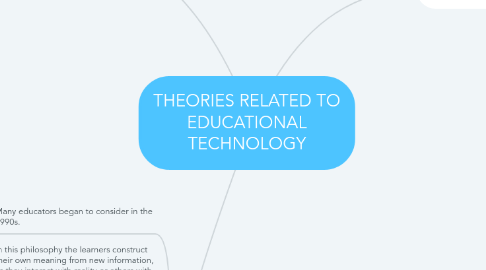
1. Behaviorism
1.1. Was developed in the early 20th Century
1.2. By the Theoretical framework with the animal learning experiments.
1.3. Some of the Psychologists were: Ivan Pavlov, Edward Thorndike, Edward C. Tolman, Clark L. Hull, B.F. Skinner
1.4. This philosophy of learning has lost favor with many educators.
1.5. Skinner's Contribution
1.5.1. Improvements of teaching based on his functional analysis of Verbal Behavior and wrote "The Technology of Teaching".
1.5.2. Promote his system called programmed instruction.
1.6. Ogden Lindsley
1.6.1. Developed the Celeration learning system similarly based on behavior analysis.
2. Constructivism
2.1. Many educators began to consider in the 1990s.
2.2. In this philosophy the learners construct their own meaning from new information, as they interact with reality or others with different perspectives.
2.3. Constructivist learning environments
2.3.1. student requieres
2.3.1.1. to use their prior knowledge
2.3.1.2. experiences to formulate new
2.3.1.3. related, and/or adaptive concepts in learning.
2.4. Role of the teacher
2.4.1. becomes a facilitator
2.4.2. provide guidance
2.4.2.1. so
2.4.2.1.1. learners can construct their own knowledge
2.4.3. must make sure that the prior learning experiences are appropriate and related to the concepts being taught.
2.4.4. Use technology when teaching with a constructivist perspective
2.4.4.1. should choose
2.4.4.1.1. technologies that reinforce prior learning perhaps in a problem-solving environmen
2.5. Jonassen (1997)
2.5.1. suggests
2.5.1.1. "well-structured" learning environments are useful for novice learners
2.5.1.2. "ill-structured" environments are only useful for more advanced learners.
3. Cognitivism
3.1. Since the very early beginning of the Cognitive Revolution of the 1960s and 1970s,
3.2. Cognitive science has changed on how educators view learning.
3.3. Cognitive theories look beyond behavior to explain brain-based learning.
3.4. Consider how human memory works to promote learning.
3.5. Theoretical framework in Cognitive Psychology were established by:
3.5.1. Atkinson-Shiffrin memory model and
3.5.2. Baddeley's Working memory model
3.6. During the 1970s, 1980s, and 1990s
3.6.1. New cognitive frameworks of learning began to emerge.
3.7. Cognitive Science theory
3.7.1. Was influenced by the Computer Science and Information Technology.
3.7.2. Another influence Noam Chomsky
3.8. The Cognitive concepts of short term memory and long term memory
3.8.1. have been facilitated by research and technology from the field of Computer Science.
3.9. The area of media psychology
3.9.1. is both cognative and affective and is central to understanding educational technology.
